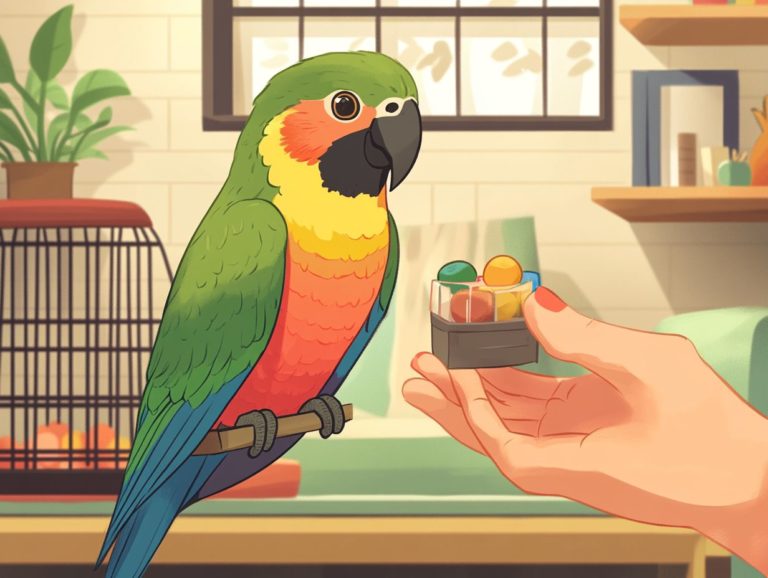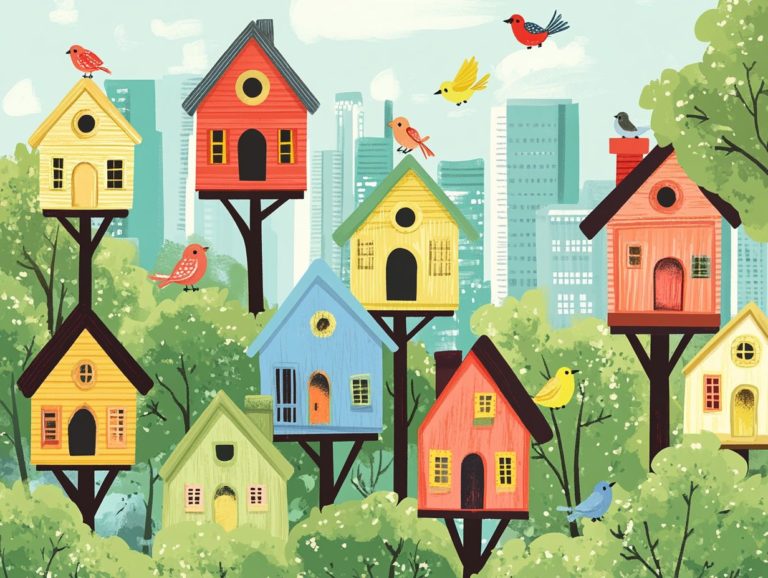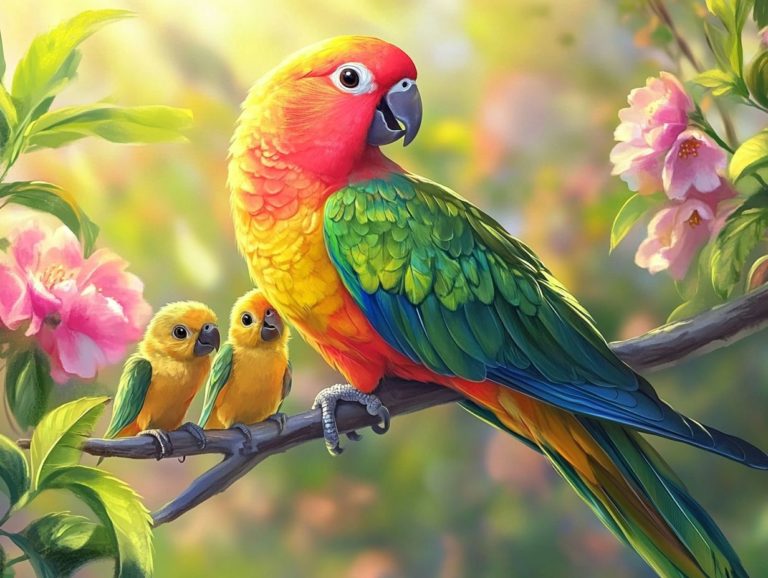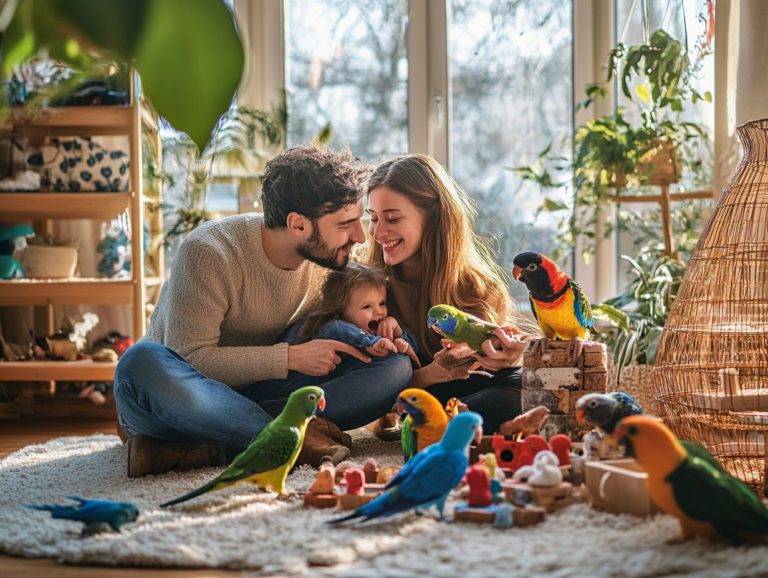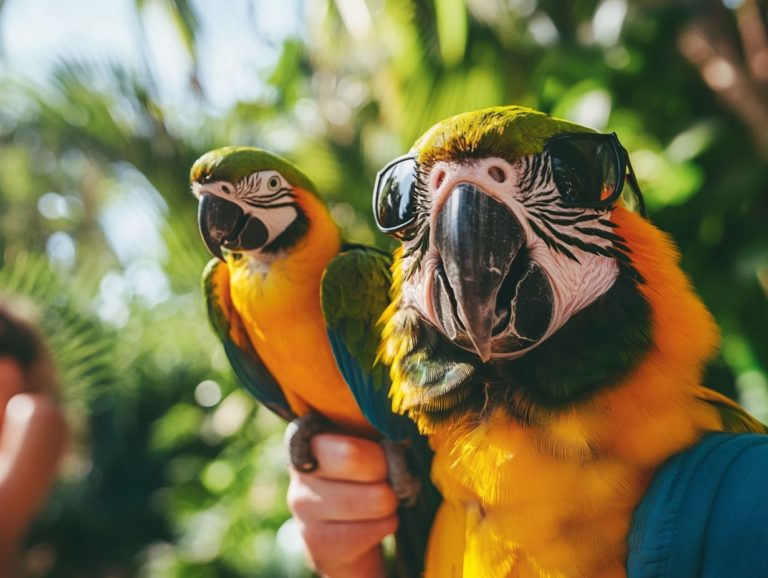5 Tips for Finding the Right Bird Rescue
Finding the perfect bird rescue is exciting and crucial for your feathered friend! With an array of options at your fingertips, navigating this journey can feel daunting.
This article offers practical tips to help you research and evaluate rescues with confidence. From grasping their reputation to asking about their care practices, we’ll outline key questions to ask and red flags to watch for.
You can also support these organizations even if you aren’t looking to adopt. Let s embark on this journey to find your ideal avian companion!
Contents
- Key Takeaways:
- 1. Research the Rescue’s Reputation
- 2. Visit the Rescue in Person
- 4. Find Out About Their Adoption Process
- 5. Inquire About Their Bird Care Practices
- Why Is It Important to Find the Right Bird Rescue?
- What Are the Signs of a Reputable Bird Rescue?
- What Questions Should You Ask When Visiting a Bird Rescue?
- How Can You Ensure the Rescue Is Providing Proper Care for Their Birds?
- What Are the Red Flags to Look Out for When Choosing a Bird Rescue?
- How Can You Support and Help a Bird Rescue Even If You Don’t Adopt?
- Frequently Asked Questions
- What should I look for when searching for a bird rescue?
- How can I determine if a bird rescue is ethical?
- Is it better to adopt a bird from a rescue or buy one from a pet store?
- What if I suspect a rescue is mistreating birds?
- How can I support a bird rescue if I am unable to adopt a bird?
- What should I do if I can’t find a bird rescue in my area?
Key Takeaways:
- Do your research and ask for references to ensure the rescue has a good reputation.
- Visit the rescue in person to see the conditions and interact with staff and birds.
- Ask about their adoption process and bird care practices to ensure they align with your expectations.
1. Research the Rescue’s Reputation
When you come across an injured bird, it s essential to research the reputation of people trained to help injured wild animals to ensure the bird receives the proper care it desperately needs. Look into licensed wildlife rehabilitators and local bird rescues, like the Wild Bird Fund in New York, to gauge their expertise and reliability.
By swiftly capturing the injured bird and transporting it safely, you can dramatically enhance its chances of recovery. Take the time to evaluate their certifications, read reviews, and ask about their success rates to make an informed choice for the bird s future.
It’s equally important to understand the legal considerations; handling wild birds often involves regulations that must be adhered to for their safety and protection. Start by gathering information online, perusing local directories, and visiting bird rescue websites to compile a thorough list of potential helpers, including resources on how to find permanent homes for rescued birds.
When you reach out, don t hesitate to ask specific questions about their experience with the species in question and their treatment methods. Seeking testimonials from the community is also wise; a solid reputation often reflects the quality of care provided.
Organizations like the Wild Bird Fund not only focus on rehabilitation but also offer education on best practices, making them an invaluable resource for anyone looking to aid injured wildlife.
2. Visit the Rescue in Person
Visiting a wildlife rehabilitator in person allows you to assess their facilities and gain a deeper understanding of how they care for injured birds. By observing their operational methods, you can determine whether they provide a safe and nurturing environment, ensuring that your prompt action in transporting the injured bird is handled with the utmost care.
This visit also presents an opportunity for you to ask questions about their approaches to handling wild birds and the types of injuries they typically treat, further informing your decision on where to take the bird.
In addition to evaluating the care provided, it s wise to closely examine the equipment they use, such as bird carriers and feeding tools, ensuring that everything meets appropriate standards.
Engaging directly with the staff during your visit can offer valuable insight into their rehabilitation practices and philosophies. Taking notes on what you observe and learn will aid in comparing different facilities. This thoughtful approach not only helps you make informed choices but also increases the likelihood of a successful recovery for the injured bird.
Take the first step today and connect with a local bird rescue!
4. Find Out About Their Adoption Process
Understanding the adoption process at a wildlife rescue is essential for ensuring that injured birds find safe and loving homes after rehabilitation. This knowledge helps you choose a wildlife rescuer who aligns with your values and informs you of any legal considerations.
By asking about their specific adoption procedures, especially how they place pigeons, doves, and songbirds in nurturing environments, you empower yourself to make informed decisions regarding the care of injured birds.
Familiarizing yourself with the adoption criteria greatly enhances your chances of successfully welcoming a bird into your home. Many rescues emphasize creating a suitable habitat and practicing responsible care, including proper diet and socialization. If you’re interested in helping birds, learning how to start a bird rescue can provide valuable insights. It’s equally important to understand follow-up care, which refers to ongoing support for the bird after rehabilitation.
Choosing a wildlife rescuer who prioritizes animal welfare is crucial. They adhere strictly to legal guidelines and ethical standards, ensuring every bird has the best chance at a happy life beyond rehabilitation.
5. Inquire About Their Bird Care Practices
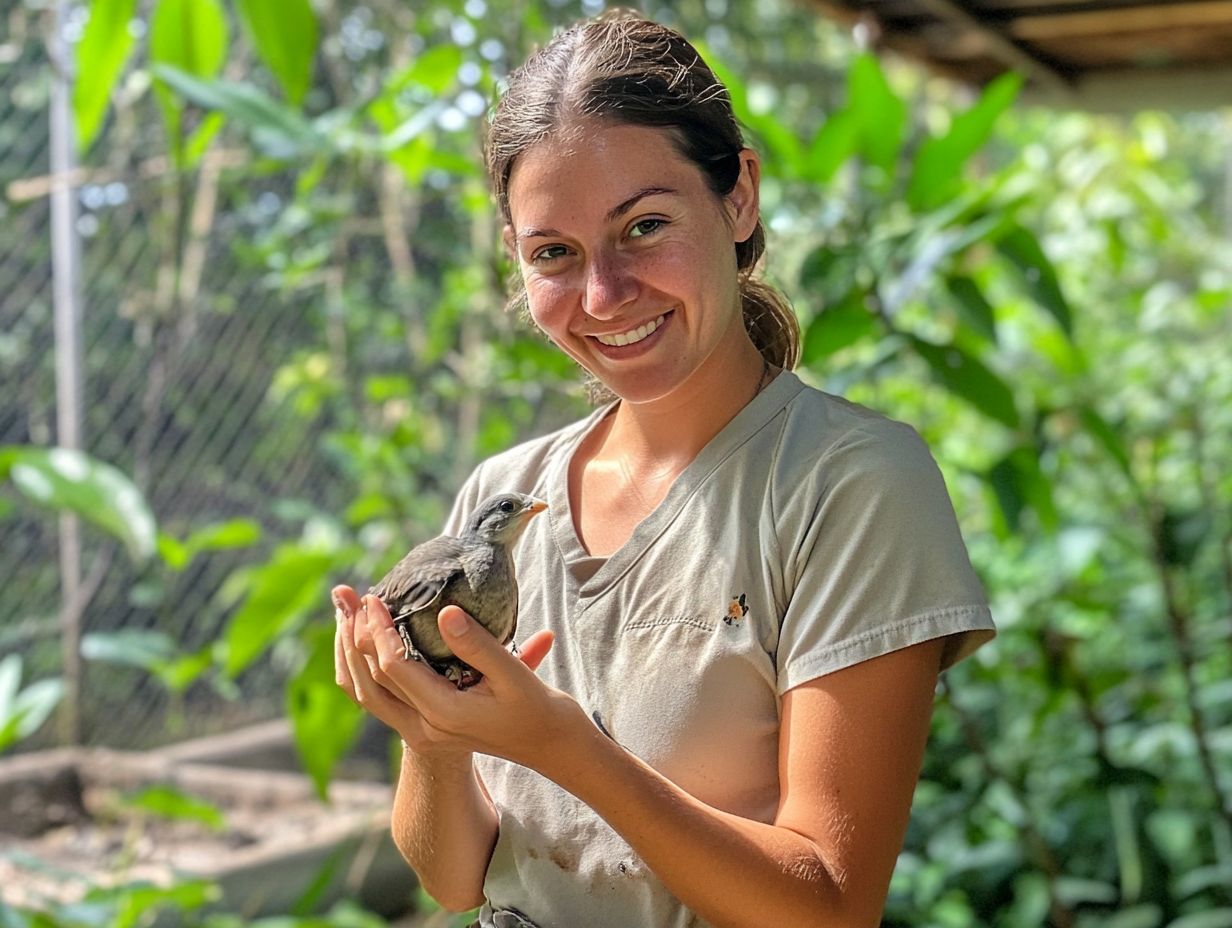
Inquiring about a wildlife rescuer’s bird care practices is vital for understanding how they assist injured birds in recovery.
Look into their feeding regimens to uncover specific dietary needs tailored to various species. These needs often differ based on natural habitats and feeding behaviors. Understanding their rehabilitation procedures, including injury assessments and recovery plans, provides valuable insights into the entire process.
It’s important to explore how veterinarians collaborate with wildlife rescuers, especially when specialized medical treatments are necessary. This dialogue deepens your understanding of avian care and gives you the power to make informed decisions should you encounter an injured bird in the future.
Don’t hesitate to ask how they customize care techniques based on species and injury severity. This knowledge provides important context regarding the challenges faced during recovery.
Why Is It Important to Find the Right Bird Rescue?
Finding the right bird rescue is essential for ensuring that injured birds receive the best possible care. This significantly impacts their chances of recovery and successful rehabilitation. By learning how to support your local bird rescue efforts, you can choose a qualified wildlife rescuer who can truly save lives for birds that have been harmed or displaced.
Connecting with local bird rescues gives you access to licensed wildlife professionals equipped with the knowledge and resources needed to provide the specialized care that injured birds require. Recognizing the importance of proper care allows you to play a vital role in facilitating a bird’s journey back to health and its return to the wild.
On the flip side, selecting the wrong rescue organization can lead to neglect and inadequate treatment, worsening the plight of vulnerable bird populations. This not only hinders individual recoveries but can also disrupt the natural balance that birds maintain through pollination, pest control, and the overall health of their habitats.
Act now to prevent neglect and ensure proper treatment! By choosing a reputable wildlife rescuer, you contribute to a cycle of restoration. Healthy birds reintroduced into their natural environments can lead to thriving local populations, fostering biodiversity and ensuring that all species can flourish together.
What Are the Signs of a Reputable Bird Rescue?
To identify a reputable bird rescue, look for key signs of their commitment to helping injured birds. Additionally, consider seeking out resources like 5 tips for transitioning your bird post-adoption to ensure a smooth process. Licensed individuals should also be able to share success stories from those they’ve helped.
A trustworthy rescue clearly outlines care protocols for various bird species. This ensures each bird gets the attention and treatment it needs to recover.
Reputable rescues maintain open communication. They invite questions about their methods and might host community events to teach the public about bird conservation.
Positive feedback from local residents indicates their reliability. Assessing these characteristics is essential when deciding where to take an injured bird.
What Questions Should You Ask When Visiting a Bird Rescue?
When visiting a bird rescue, ask questions that align with your values about the care of injured birds. Additionally, you can explore volunteer opportunities at local bird rescues and inquire about their licensing and the qualifications of their staff.
Investigate the types of injuries they treat and their rehabilitation methods. Understanding their emergency protocols can offer insights into the quality of care they provide.
Ask how they educate the public about bird conservation and the challenges they face. This discussion will equip you to make an informed decision about where to seek help for an injured bird.
How Can You Ensure the Rescue Is Providing Proper Care for Their Birds?
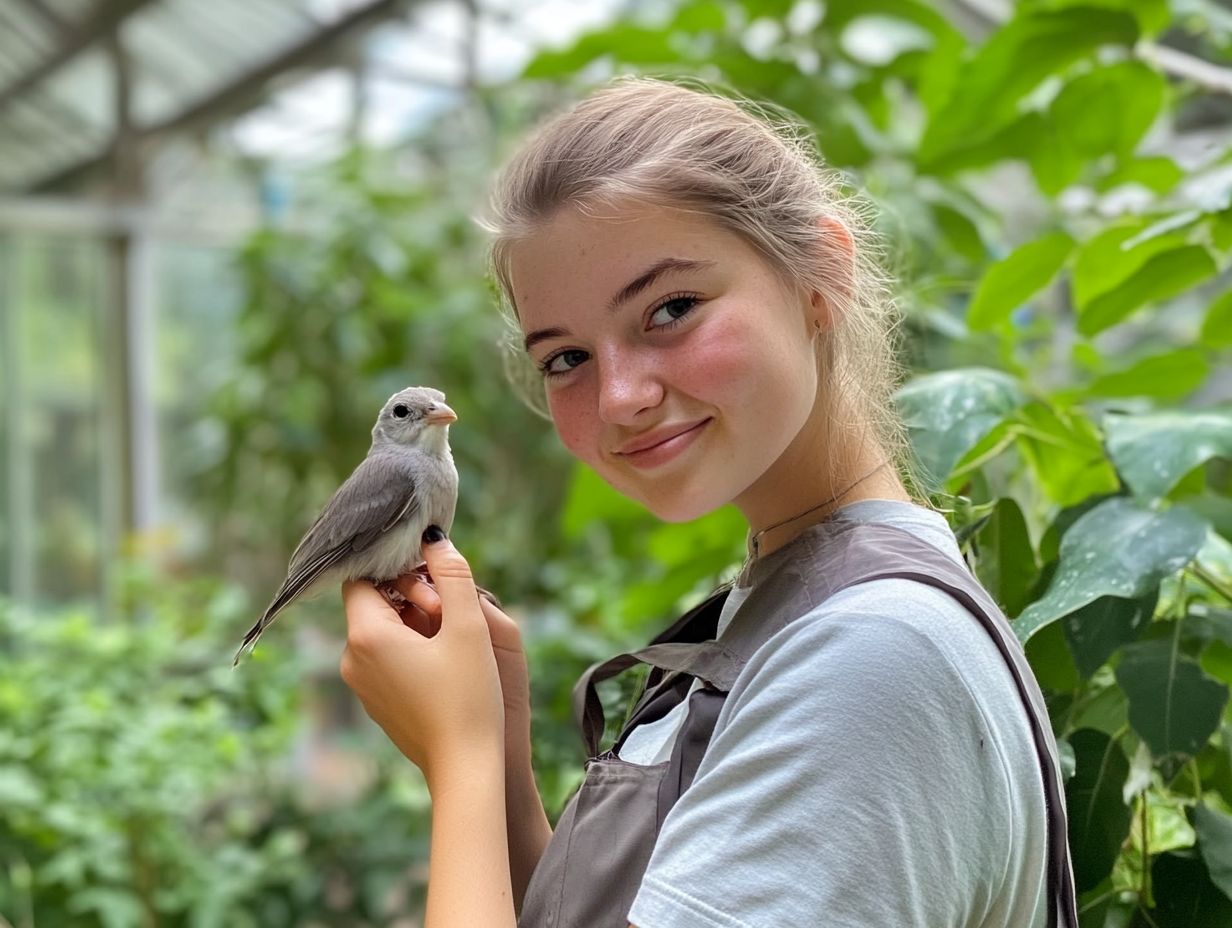
To ensure a rescue provides the highest standard of care, observe their facility and ask insightful questions. Look for third-party reviews that speak to their practices.
Check for evidence of veterinary involvement and appropriate feeding practices. A clean, safe environment is crucial for rehabilitating birds like doves, pigeons, and songbirds.
Inquire about their protocols for quarantine and species treatment. Ask about the timeline for releasing birds and procedures for long-term care.
Evaluating how staff interact with the birds reveals the nurturing environment they create. Gathering this information empowers you to make a decision that positively impacts these vulnerable creatures.
What Are the Red Flags to Look Out for When Choosing a Bird Rescue?
Recognizing the red flags when choosing a bird rescue is crucial to ensure you don’t inadvertently place an injured bird in a situation that could worsen its condition. Additionally, once you’ve rescued a bird, consider following tips for selecting the right bird toys to create a safe and enriching environment.
It s essential to evaluate the overall environment and approach of the rescue. For instance, if the rescue routinely refuses to provide documentation of their medical care standards or gives vague answers about their rehabilitation processes (the methods used to help birds recover), that could be a sign of negligence.
Keep an eye out for frequent complaints from former clients regarding poor communication or delays in care; these can indicate systemic issues within the organization. Observing how the staff interacts with the birds is equally important. If they don t treat the animals with respect or seem indifferent to their needs, it s a strong signal that the well-being of the birds may not be a priority.
By considering these factors, you can make a more informed decision about the safety and care of the birds in need.
How Can You Support and Help a Bird Rescue Even If You Don’t Adopt?
Even if you choose not to adopt a bird, you can make a big difference in many exciting ways! There are countless ways for you to support a bird rescue, ensuring that injured birds receive the essential care they require.
You might consider dedicating a few hours each week at a local sanctuary or organizing fundraising events. Donations whether in the form of money or supplies like bird food, medical equipment, or nesting materials are crucial for sustaining these vital rescue operations.
Advocacy plays an important role too. By effectively sharing the mission and needs of local rescues, you can inspire others to get involved. Exploring local opportunities enriches your own life and fosters a compassionate community dedicated to protecting wildlife. Together, we can pave the way for a brighter future for all birds in need.
Frequently Asked Questions
What should I look for when searching for a bird rescue?
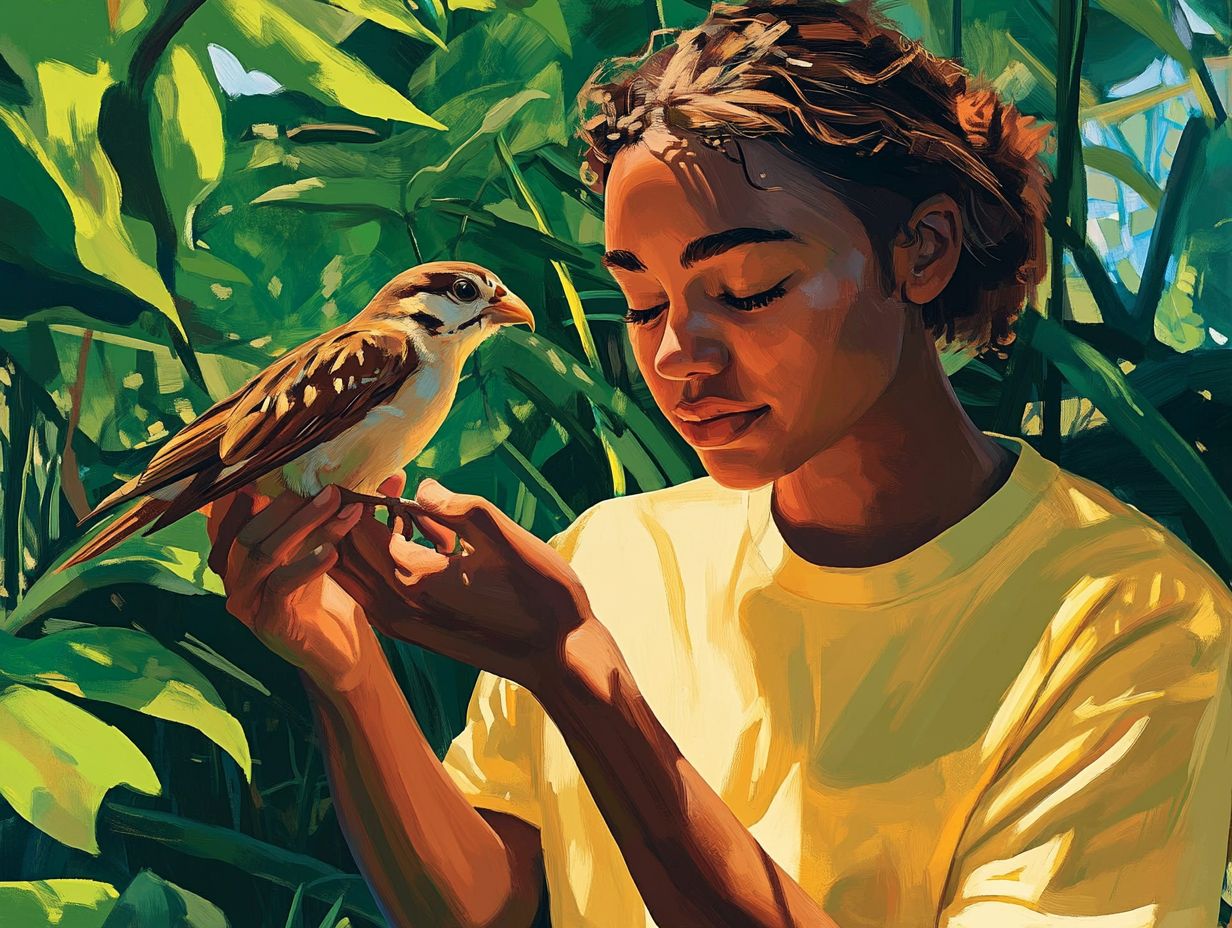
When searching for a bird rescue, look for reputable organizations that prioritize the welfare of the birds in their care. Ensure the rescue is licensed and has experienced staff who are knowledgeable about bird care, including tips for successful bird rehabilitation.
How can I determine if a bird rescue is ethical?
You can determine if a bird rescue is ethical by researching their history and reputation. Look for reviews and ask for references from other bird owners. Additionally, consider learning how to help a bird in need before adoption, and check if the rescue has any partnerships or affiliations with other reputable organizations.
Is it better to adopt a bird from a rescue or buy one from a pet store?
It is always better to adopt a bird from a rescue rather than buying one from a pet store. Not only does it give a bird in need a second chance at a happy life, but it also supports the important work of bird rescues.
What if I suspect a rescue is mistreating birds?
If you suspect a bird rescue is mistreating their birds, it’s important to report it to the proper authorities. Contact your local animal control or humane society and provide them with any evidence you have. Ensuring the well-being of all birds in rescues is crucial.
How can I support a bird rescue if I am unable to adopt a bird?
There are many ways to support a bird rescue if you are unable to adopt a bird. You can volunteer your time, donate money or supplies, or even foster a bird temporarily. Spread awareness and educate others about the importance of bird rescues and adoption.
What should I do if I can’t find a bird rescue in my area?
If you can’t find a bird rescue in your area, you can also look in nearby cities or states. Reach out to local bird clubs or organizations to see if they have any recommendations. Additionally, you can check out 5 ways to encourage bird adoption in your community or consider adopting a bird from a reputable breeder who prioritizes the well-being of their birds.
Join your local bird rescue efforts now!

